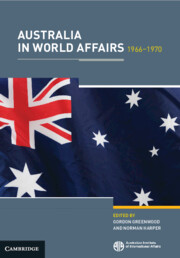Book contents
- Frontmatter
- Preface
- Contents and Contributors
- Maps
- Part One The Australian Community
- Part Two The International Community
- 3 Foreign Trade
- 4 Foreign Payments
- 5 Foreign Investment
- 6 Foreign Aid
- 7 Immigration: 1949–1970
- 8 The United Nations
- Part Three The Pacific and Asia
- Part Four The Seventies: Australia’s Options
- Index
- Plates
8 - The United Nations
from Part Two - The International Community
Published online by Cambridge University Press: 29 March 2024
- Frontmatter
- Preface
- Contents and Contributors
- Maps
- Part One The Australian Community
- Part Two The International Community
- 3 Foreign Trade
- 4 Foreign Payments
- 5 Foreign Investment
- 6 Foreign Aid
- 7 Immigration: 1949–1970
- 8 The United Nations
- Part Three The Pacific and Asia
- Part Four The Seventies: Australia’s Options
- Index
- Plates
Summary
From time to time, the Commonwealth parliament in Canberra hears a formal ministerial statement on foreign affairs in which the minister expresses his government’s view of current international developments and lists the fundamental bases of its foreign policy. Over a period, these lists show interesting priority variations but in the case of one item, the United Nations, variation is not quite the right term. In March 1947, for example, the priorities listed by the Labor government’s Dr H. V. Evatt were: first, full support for the United Nations; second, stronger British Commonwealth ties; third, regional participation; fourth, area security arrangements with the United States and others. His successor in the Liberal-Country Party coalition government, P. C. (later Sir Percy) Spender, in his first statement of principles on 9 March 1950, raised the American security alliance to second place and dropped the United Nations to fourth, and at that hedged by reservations.
Keywords
- Type
- Chapter
- Information
- Australia in World Affairs 1966–1970 , pp. 206 - 230Publisher: Cambridge University PressFirst published in: 2024

